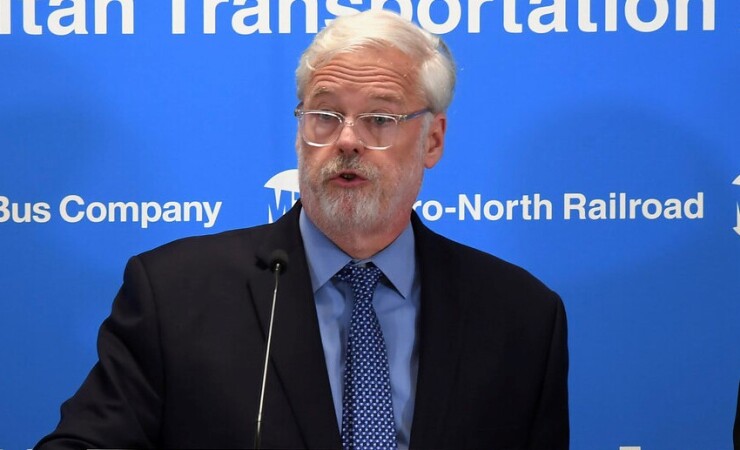Questions from transit observers and advocates followed the announcement by New York’s Metropolitan Transportation Authority of a five-year, $51.5 billion
MTA officials on Monday outlined the plan, on which the board will vote next week. It includes $40 billion for New York City Transit, which operates the city’s subways, as well as major investments in Long Island and Metro-North railroads.

The plan calls for increasing spending on infrastructure by 70% over current levels.
The single largest source of funds for the plan — $25 billion — comes from bonds backed by new revenue streams authorized in this year’s state budget, including $15 billion from congestion pricing. The legislature and Gov. Andrew Cuomo signed the tolling plan for New York City's central business district into law as part of the state’s fiscal 2020 budget.
“At the end of this five-year period, New Yorkers will see a revitalized and modern system for the 21st century and beyond,” said MTA Chairman Patrick Foye.
Andrew Rein, president of the watchdog Citizens Budget Commission, asked whether the MTA is spending money on the right things.
“The MTA has yet to make public a comprehensive needs assessment,” Rein said. “It is unclear whether this plan’s investments will be sufficient to maximize progress on bringing the system to a state of good repair, especially considering significant investment in service expansion.”
The MTA anticipates receiving $10.68 billion from federal funding programs. Another $10 billion will come from bonds backed by newly established revenue sources dedicated to public transportation: a progressive tax on high-end real estate sales and the elimination of the internet tax advantage.
Lack of a reliable funding source has raised red flags with the rating agencies.
Twice in 2018, S&P Global Ratings downgraded the MTA’s workhorse transportation revenue bonds, landing at A with a negative outlook. In December, Moody’s Investors Service revised its outlook on those bonds to negative from stable while affirming its A1 rating.
Fitch Ratings has maintained its AA-minus rating since upgrading from A in June 2017. Kroll Bond Rating Agency rates the credit AA-plus with a negative outlook.
Cuomo has pledged $3 billion to the capital plan, subject to lawmakers’ approval, and New York City Mayor Bill de Blasio has been asked to pledge an equal amount. The remaining $9.8 billion will come from the MTA in the form of pay-as-you-go capital contributions and bonds backed by longstanding dedicated taxes, fares and revenues from existing tolling.
“The plan assumes $3 billion in funding from New York State and $3 billion from New York City; neither the state nor the city has authorized these commitments,” Rein said. “Furthermore, it is unclear whether the MTA will be able to finance fully $9.8 billion in bonds and pay-as-you-go capital given its projected operating deficits.
“Finally, bonding out revenue from the new sales tax intercept and real estate transfer tax expansion means that equivalent funding in subsequent capital plans would require additional revenue increases,” Rein added.
The MTA, which carries roughly $43 billion of debt, intends to sell $102 million of Triborough Bridge & Tunnel Authority Series 2019B taxable general revenue refunding bonds this week, with JPMorgan as lead manager.

Funding, MTA officials said, would benefit signal modernization, station accessibility, station improvements, track upgrades, and Phase 2 of the new Second Avenue subway line to East Harlem, along Manhattan’s Upper East Side.
"We need to understand how the MTA plans to engage in cost controls on expansion projects, how state of good repair will be prioritized, and how the MTA will keep its progress transparent," said Nick Sifuentes, executive director of the Tri-State Transportation Campaign.
Success hinges on its eventual settlement with labor unions, according to Nicole Gelinas, a senior fellow with the Manhattan Institute for Policy Research. The major labor group, Transport Workers Union Local 100, has to date resisted MTA calls or cost savings in the current negotiations.
“Labor savings are important for two reasons: first, congestion pricing will only cover about half of this capital plan, meaning the MTA still needs revenue for capital; and second, the MTA still faces massive operating deficits over the next few years, and making all of these capital investments will not matter as much if the MTA still has to cut back on service,” Gelinas said.
A state capital review panel would vet the capital plan after MTA board approval.
“We are hopeful that all of the much-needed funds from the city, state and federal governments will be forthcoming to get things moving quickly,” said Lisa Daglian, executive director of the watchdog Permanent Citizens Advisory Committee to the MTA.
“The cost of delayed projects is too high.”
Manhattan congestion pricing is supposed to begin in 2021.
Think tank Regional Plan Association on Tuesday outlined 10 policy proposals for successfully implementing central district tolling. The report, titled
"Now we need to move forward with an eye toward designing a fair and effective system that is well-enforced and measurable," said RPA president Tom Wright.





